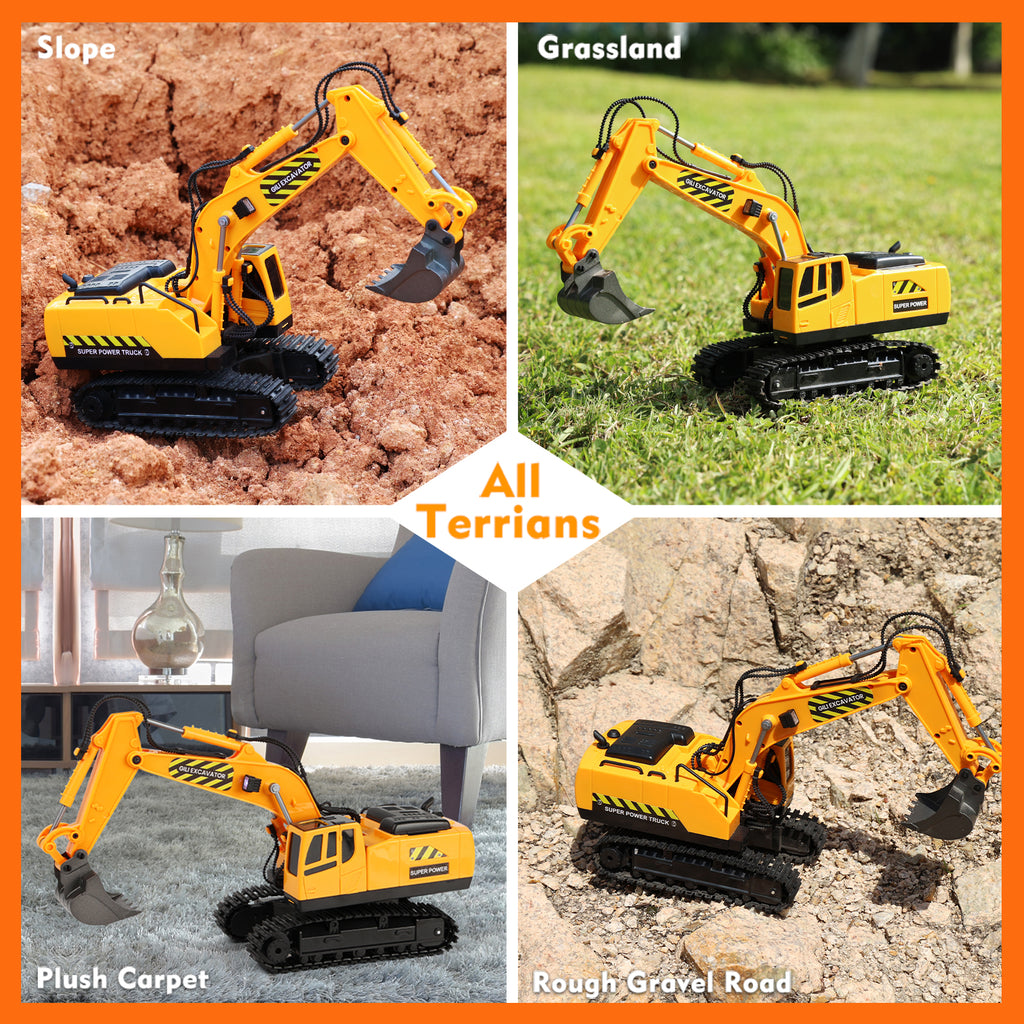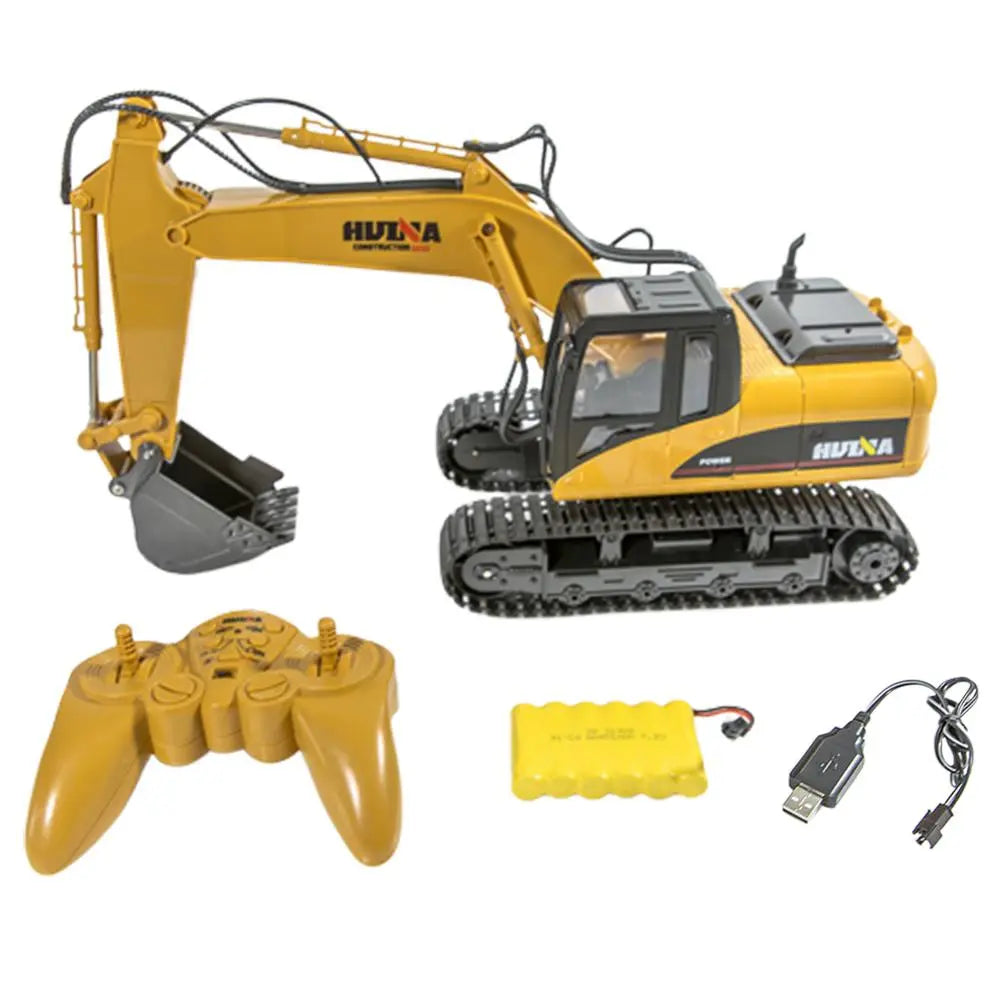Why a rc excavator Is Crucial for Safety and Precision in Construction Projects
Discover the Importance of Excavator in Modern Building And Construction Projects
Excavators are vital devices in contemporary construction tasks. Their adaptability permits them to perform a broad array of jobs, from digging and grading to demolition and site preparation. Advanced features, such as hydraulic add-ons and general practitioners, improve their capacities and efficiency on job websites. As the sector advances, the value of excavators grows much more. Comprehending their function can reveal insights right into the future of building techniques. What exists in advance for these equipments?
The Adaptability of Excavators in Various Projects
Excavators are often associated with massive construction jobs, their versatility allows them to be utilized in a vast variety of applications, from domestic landscape design to utility maintenance. In city settings, excavators can navigate limited areas to dig foundations for homes or set up drainage systems. Their capability to perform fragile jobs makes them suitable for landscaping tasks, where they can excavate for ponds or plant trees. On top of that, excavators play an important duty in utility maintenance, efficiently digging trenches for pipes or cables without interrupting surrounding areas. In farming applications, they aid in land clearing up and soil prep work. In addition, their flexibility allows them to be geared up with various accessories, improving their performance across various jobs. This complex nature of excavators not only simplifies different building procedures but also demonstrates their integral function in modern infrastructure growth and upkeep.
Trick Attributes and Kinds Of Excavators
The discussion on crucial functions and sorts of excavators highlights the essential features that make these machines vital in building. Numerous excavator types, each developed for particular tasks, show their versatility and effectiveness across various applications. rc excavator. Recognizing these attributes and classifications is vital for maximizing their use in contemporary construction projects
Excavator Types Review
Excavators play a pivotal function in contemporary building, using convenience and performance across numerous jobs. These hefty equipment systems come in numerous kinds, each tailored for certain applications. One of the most typical types include crawler excavators, known for their stability on uneven terrain, and rolled excavators, which give higher flexibility on paved surface areas. Mini excavators are favored for small-scale tasks and limited rooms, while long-reach excavators are developed for deep excavating. Furthermore, there are customized excavators, such as hydraulic excavators, which improve power and precision. Each type includes unique abilities, making them crucial for tasks varying from excavating and grading to demolition and material handling. Comprehending these variations enables building specialists to choose the ideal excavator for their task requires.
Key Features Explained
Understanding the vital attributes of excavators improves their reliable application in construction tasks. Excavators are identified by their effective hydraulic systems, which provide the necessary pressure for excavating, lifting, and relocating products. Their articulated arms enable a wide variety of movement, facilitating accurate operations in restricted areas. In addition, the range of attachments, such as containers, grapples, and augers, expands their adaptability to meet different job requirements. The size and weight of excavators likewise add to their security and maneuverability on different terrains. Innovations in technology have actually led to the integration of GPS and automation, enhancing accuracy and effectiveness in excavation jobs. These features jointly position excavators as crucial tools in contemporary building and construction.
Applications in Building and construction
Transforming building sites, excavators play a critical function across different applications, ranging from domestic structure tasks to massive framework advancements. These versatile devices are furnished for jobs such as excavating structures, trenching for energies, and website grading. Various sorts of excavators, consisting of spider, rolled, and mini excavators, supply specific advantages customized to the task requirements. Crawler excavators master harsh surfaces, while rolled excavators offer movement on paved surfaces. Miniature excavators are optimal for constrained areas, making them prominent in urban setups. The performance and power of excavators significantly speed up building procedures, ensuring prompt job conclusion. Their versatility further improves their relevance, allowing construction teams to tackle a varied range of difficulties properly.
Enhancing Efficiency and Performance on Work Sites
Making the most of performance and performance on work websites is a crucial objective in modern building and construction. Excavators play an essential function in attaining this objective by enhancing different tasks. Their capacity to do several functions-- such as lifting, grading, and digging-- decreases the demand for added equipment, thereby conserving time and resources.Moreover, excavators boost process by permitting faster conclusion of jobs. With advanced functions like hydraulic accessories and GPS modern technology, they can carry out accurate procedures that minimize errors and rework. This accuracy not only improves the quality of job yet likewise optimizes material use, adding to cost savings.The flexibility of excavators permits them to adapt to different website conditions, making certain that jobs progress efficiently regardless of challenges. By integrating excavators into construction processes, groups can significantly boost their general performance, bring about timely task conclusion and boosted profitability.
Security Advantages of Using Excavators
Excavators significantly improve safety and security on construction websites via boosted driver visibility and minimized manual work risks. By supplying operators with a clear sight of their environments, excavators aid to stop crashes and injuries. Additionally, the equipment reduces the demand for workers to participate in hazardous manual jobs, further advertising a more secure workplace.
Improved Driver Exposure
Although construction websites can be chaotic and loaded with prospective risks, improved operator visibility plays a crucial function in ensuring security when using excavators. Modern excavators are made with huge, unobstructed home windows and strategically put mirrors, allowing drivers to keep a clear sight of their environments (rc excavator). This enhanced visibility is critical for detecting pedestrians, various other machinery, and various obstacles, considerably reducing the risk of accidents. Furthermore, many excavators incorporate innovative innovation, such as sensors and cameras, to offer drivers with additional perspectives, further boosting understanding. The ability to see even more plainly not only help in reliable operation but additionally cultivates a safer job setting, making it simpler for drivers to navigate intricate building and construction websites without endangering safety criteria
Decreased Handbook Labor Threats
When manual labor is reduced via the use of excavators, various safety benefits emerge, considerably enhancing the wellness of building employees. Excavators minimize look at these guys the physical strain connected with heavy training and repetitive jobs, properly lowering the danger of bone and joint injuries. By automating procedures such as excavating, grading, and relocating products, they enable workers to preserve a safer range from potential threats. In addition, excavators are equipped with advanced safety and security functions, such as rollover protection systems and improved driver comfort designs, which even more secure employees on website. The result is a considerable decrease in workplace mishaps and injuries, resulting in boosted efficiency and spirits among construction groups. Eventually, the adoption of excavators adds to a safer and a lot more efficient building and construction environment.
Excavators in Earthmoving and Website Prep Work
In modern-day construction, a considerable portion of earthmoving and site prep work jobs relies upon the performance and versatility of excavators. These devices are made to take care of various dirt kinds and terrain, making them vital for grading, excavating, and trenching activities. Their hydraulic arms can be equipped with various attachments, such as pails and augers, allowing operators to personalize their technique based upon particular task requirements.Excavators stand out at moving big volumes of planet promptly and efficiently, which speeds up the general building timeline. They can browse limited areas and testing websites where conventional devices might battle, enhancing productivity. Additionally, the accuracy of excavators assurances that website prep work sticks to stringent requirements, minimizing the risk of errors that can result in pricey rework.
The Duty of Excavators in Demolition Tasks
Excavators play an important duty in demolition tasks, as they have the power and dexterity required to dismantle frameworks effectively. Geared up with different accessories such as hydraulic breakers, shears, and grapples, these equipments can adapt to different demolition requirements, whether for little buildings or big commercial websites. Their flexibility enables drivers to tackle intricate jobs while keeping safety and security and precision.In addition to their demolition capacities, excavators facilitate particles removal, guaranteeing that work sites remain orderly and risk-free. By damaging down frameworks into convenient items, they allow for streamlined cleaning and recycling of products, straightening with modern sustainability efforts.Moreover, excavators can access limited rooms and browse irregular surface, making them indispensable in city demolition jobs. In general, their robust design and multifunctionality make excavators a vital property in the demolition stage of building, adding substantially to job timelines and efficiency.


Future Fads in Excavator Modern Technology and Use
As the building and construction sector advances, advancements in excavator technology are poised to transform their usage and effectiveness considerably. One significant fad is the assimilation of automation and expert system, allowing excavators to run with marginal human intervention. This change will improve precision in jobs such as grading and trenching, lowering human error and increasing productivity.Additionally, the rise of hybrid and electric excavators is shaping a more sustainable building setting, lowering carbon exhausts and gas expenses. Boosted telematics systems are likewise arising, enabling real-time monitoring of equipment efficiency and maintenance requirements, which can cause much better functional efficiency and longer tools lifespan.Moreover, improvements in add-on modern technology are increasing the convenience of excavators, enabling them to perform a broader variety of jobs. The mix of these fads shows a future where excavators are smarter, greener, and a lot more versatile, eventually improving construction project characteristics.
Often Asked Concerns
Just How Do Excavators Compare to Various Other Building And Construction Machinery?
Excavators, defined by their adaptability and power, stand out in excavating and earthmoving compared to other equipment. Their capability to execute various jobs, including training and demolition, makes them indispensable in building jobs, improving total effectiveness.

What Is the Ordinary Life Expectancy of an Excavator?
The ordinary lifespan of an excavator usually ranges from 7,000 to 10,000 operating hours, depending upon upkeep, usage conditions, and design. Proper treatment can expand this lifespan, guaranteeing peak efficiency throughout its operational years.
How Are Excavators Maintained for Ideal Efficiency?
Excavators need regular maintenance for my review here peak efficiency, consisting of routine examinations, liquid checks, filter substitutes, and prompt repairs. Implementing a preventive maintenance timetable aids lengthen their life-span and warranties efficient operation in various construction settings.
What Are the Prices Connected With Leasing vs. Purchasing an Excavator?
The costs connected with leasing versus buying an excavator vary significantly. Renting out offers lower upfront expenditures yet can collect in time, while purchasing needs a significant preliminary financial view it investment, however gives long-term cost savings and property possession advantages.
What Training Is Needed to Operate an Excavator?
Running an excavator requires specialized training, usually including safety and security procedures, device operation techniques, and ecological recognition. Accreditation programs frequently mandate sensible experience, making it possible for operators to manage various tasks efficiently while ensuring conformity with industry guidelines. The most typical kinds include spider excavators, understood for their security on uneven surface, and wheeled excavators, which give higher flexibility on smooth surface areas. Tiny excavators are preferred for small projects and limited rooms, while long-reach excavators are made for deep excavating. Additionally, there are specific excavators, such as hydraulic excavators, which improve power and precision. Different kinds of excavators, including crawler, wheeled, and mini excavators, give particular benefits tailored to the project demands. Crawler excavators stand out in harsh surfaces, while wheeled excavators use flexibility on paved surface areas.